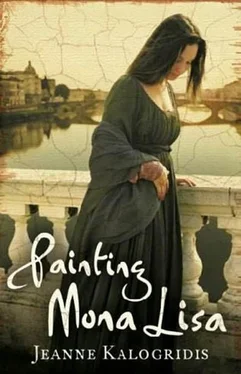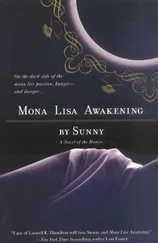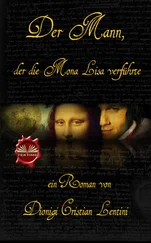He had fallen onto his side and hip; Salai had wounded him and kicked his knife away. He was helpless.
“Lisa,” he said. His eyes were feral, terrified. “What good will it serve? What good?”
What good, indeed? I crouched down and approached him with the dagger raised overhand-the wrong way. Salai would not have approved. But I wanted to bring it down the way Francesco de’ Pazzi had brought his weapon down on Lorenzo’s brother: wildly, carelessly, with a spasm of fury, with a spray of crimson, with a thousand blows for each wrong done. I would have spared no piece of his flesh.
Entrapped my father
Murdered my loved ones
Stole my life and my child
“You aren’t my husband,” I said bitterly. “You never were. For the sake of my true husband, I will kill you.” I leaned down.
And he struck first. With a small blade, hidden in his fist. It bit into the flesh just beneath my left ear and would have sliced quickly to my right. But before it reached center I pulled away, astonished, and sat back on my haunches.
“Bitch,” he croaked. “Did you think I would let you ruin it all?” He sagged to the floor, still alive, and glared at me with hatred.
I put a hand to my throat and drew it away. It was the color of garnets-a dark necklace, Francesco’s final gift.
I can bleed to death here , I thought. I can have my revenge. I can kill Francesco now and bleed to death and they will find me later, here, dead atop his corpse .
I chose not to kill him.
I heard a roaring in my ears, the sound of the tide. Like Giuliano in Francesco’s lie, I was drowning, as surely as if I had fallen into the Arno from the Ponte Santa Trinità. Fallen, and sunk deep. And I had descended to a place, finally, where my emotions were still.
I did not worry for Matteo. I knew he was safe in his grandfather’s arms. I did not worry for myself, I did not try to flee my attackers; I knew that I was no longer their target. I did not worry about Francesco or my hatred of him. I would let God and the authorities deal with him; it was not my place. I knew my place now.
Dear God , I prayed. Let me rescue Giuliano .
Through a miracle, I rose.
My body was agonizingly leaden, moving as if through water, but I willed it to do the impossible: I moved in the direction Salvatore de’ Pazzi had gone, to go in search of my beloved. The stiletto was heavy; my hand trembled with the effort to hold it.
I heard his voice.
Lisa! Lisa, where are you?
Husband, I am coming . I opened my mouth to cry out, but my voice was no more than an anguished wheeze, lost in the roar of the flood.
The waters inside the cathedral were murky; I could scarcely see the wavering images of fighters against a dizzying backdrop of innocents in flight. There were orphans here-filthy lads with small glinting blades-and men with wielded swords, peasants and priests and noblemen, but I could make no sense of it. My hearing faded until the frenzied chiming of the bells sank to nothingness. In the river, all was silent.
Sunlight streamed in from the open door leading to the Via de’ Servi, and in its shaft, I saw him: Giuliano. He wore a monk’s robes. His cowl was thrown back, revealing his dark curling hair and a beard I had never seen. In his hand was a long sword, the point tilted toward the ground as he rushed forward. He was entirely a man; in my absence, he had aged. His features, pleasingly irregular, were taut and limned with faint bitterness.
He was amazing, and beautiful, and gave me back my heart.
But I was no longer here to surrender to emotion: I was here to redeem the transgressions of others. I was here to accomplish what should have been done almost two decades ago: stop the murder of innocents.
And I saw him, Salvatore, Francesco de’ Pazzi’s son, fighting his way through the onslaught of fleeing worshipers, holding his sword at his side. He was moving toward Giuliano.
But Giuliano did not see him. Giuliano saw only me. His eyes were lights from a distant shore; his face was a beacon. He mouthed my name.
I yearned to go to him, but I could not make the mistakes Anna Lucrezia, Leonardo, the elder Giuliano, made. I could not yield to my passion. I forced my gaze from Giuliano’s face and kept it fastened on Salvatore. It was impossible to walk, yet I staggered behind him. I stayed on my feet, despite the pull of the escaping crowd. God granted a miracle: I did not fall. I did not faint or die. I half ran.
As I neared both men, Giuliano’s joyous brilliance faded to concern, then alarm. He now saw the blood spilling from my throat, soaking my bodice. He did not see Salvatore approaching from the side; he saw only me, following. He did not see Salvatore an arm’s length away, raising his sword, ready to bring it down, to kill Lorenzo’s most loved son.
But I saw. And had I possessed the strength, I would have thrown my body between the two men. I would have taken the blow meant for my beloved. But I could not reach him in time; I could not step between the two men. I could only surge forward, using all the air that remained in my lungs, and close in on Salvatore from behind.
And in the instant that Salvatore raised his blade, in the instant before he brought it down upon Giuliano, I reached farther than was possible. With the dagger, I found the soft spot beneath Salvatore’s ribs and buried it there.
I remembered the painting on the wall of the Bargello of Bernardo Baroncelli. I remembered the ink drawing of him dangling from the rope, his dead face downcast, still stamped with remorse. And I whispered:
“Here, traitor.”
Relieved, I let go a sigh. Giuliano was alive, standing in dappled sunlight on the banks of the Arno, waiting with his arms open. I sank into them and down, down where the waters are deepest and black.
Lisa
JULY 1498
I did not die, nor did Francesco. The blow I dealt Salvatore de’ Pazzi downed him, and as he lay bleeding, he was killed by another.
His mercenaries, who rode into the Piazza della Signoria at the chiming of the bells, were met by formidable opposition. Upon encountering Piero’s men-and upon learning that Salvatore would not arrive to incite the crowd against the Medici and lead the storming of the palazzo and the overthrow of the Signoria-the mercenaries disbanded and fled.
Messer Iacopo never was avenged.
It was not time, my husband explained, for the Medici to return to power in Florence; there was insufficient support in the Signoria. Piero had learned the wisdom of patience. But the time will come. The time will come.
I have learned, to my amusement, that Francesco has told everyone in Florence that I am still his wife, that I have merely gone to stay in the country with my child because of nerves caused by the fright I experienced in the Duomo. He used his wits and connections to escape the noose, but he is disgraced. He will never serve in the government again.
At last I am in Rome with Giuliano and Matteo. It is hotter here, with fewer clouds and less rain. Mists and fog are less common than in Florence; the sun reveals everything in sharp, crisp relief.
Leonardo has come to visit us now that I have regained some of my strength. I am sitting for him again-despite the bandage on my neck-and I am beginning to think he will never be satisfied with the painting. He alters it constantly, saying that my reunion with Giuliano will be reflected in my expression. He promises that he will not remain in Milan forever; when he fulfills his obligations to the Duke, he will come to Rome, with Giuliano as his patron.
Shortly after Leonardo’s arrival, when I first sat for him in Giuliano’s Roman palazzo, I asked him about my mother. The instant he had told me I was his child, I knew it was true. Because I had always looked for another man’s face in my reflection, I had never seen his. Yet I looked on his features, in feminine form, every time I smiled down at my image on the gessoed panel.
Читать дальше
Конец ознакомительного отрывка
Купить книгу












